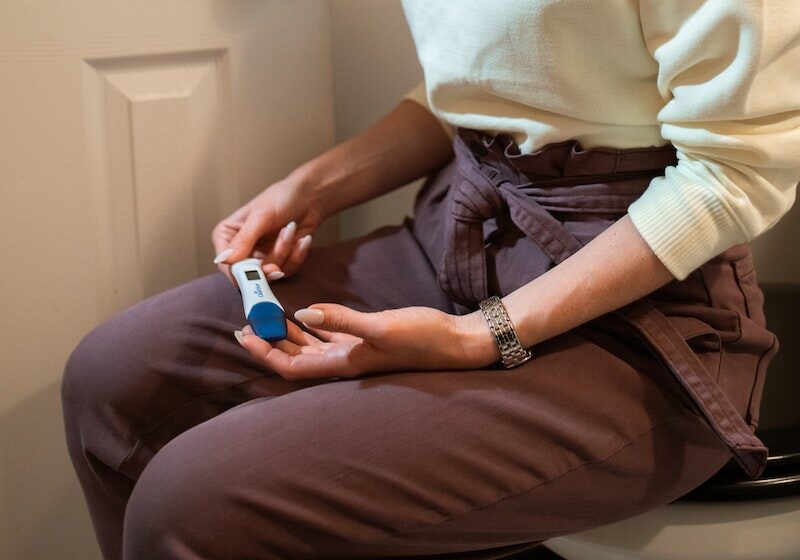It’s recommended that you wait a minimum of two weeks after unprotected sex before taking a pregnancy test. This is because it takes time for your body to build up the level of hCG that pregnancy tests detect.
However, if you are worried that you might be pregnant, you may want to take a test earlier than this. Here is how to do so.
Blood Test
Pregnancy tests check your urine for a hormone called human chorionic gonadotropin (hCG). The body only makes this when an egg is fertilized and attaches to the uterus. A pregnancy test can detect hCG in your system about 6 days after fertilization.
Home pregnancy tests are 99 percent accurate when used correctly. They can give results in one to two minutes. The results show up as a line, color, or symbol. Some tests also use words like “pregnant” and “not pregnant.”
Doctors can take a blood sample to confirm the results of your at-home test. A health care professional may tie an elastic band around your arm to increase blood flow and help the needle penetrate the vein. The procedure is painless and lasts only a few minutes. After the sample is taken, a cotton swab or a small bandage may be put on to stop any bleeding.
The results of a blood test are usually available in a few hours to a day. They are more precise than the results of a urine test, and can tell you how far along your pregnancy is. They can also provide more information about your pregnancy, such as how much hCG you have in your body or whether the embryo is developing normally. The doctor can order either a qualitative or quantitative test.
Urine Test
Many women who suspect they are pregnant use a urine test to confirm their results. Most home pregnancy tests look for a hormone called human chorionic gonadotropin (HCG), which is only produced if you are pregnant. HCG is produced when a fertilised egg attaches to the lining of your uterus. The first trace of hCG usually appears in your urine 6 days after the fertilised egg implants. The levels of hCG in your urine increase daily. The results of a urine pregnancy test can be very accurate.
A blood test can also be done to check for hCG, but it is more invasive and more expensive than a urine pregnancy test. The results of a blood test will be much more accurate, but they may not appear right away because the sample must be sent to a lab for testing.
If you are taking any medicines that might interfere with your hCG level, or are drinking a lot of fluids before the test, it might take longer to get a result. If you are unsure about your results, you can visit your doctor. They can do a more accurate blood or urine test, and interpret the results for you.
The most common way a urine test is done is by washing your hands, then collecting a urine sample into a small container. The urine should be collected from the middle of the stream, and it must be clear enough to read.
Digital Test
Whether or not you’re pregnant can depend on when you engaged in unprotected sex. For most women, it’s recommended that you wait until the first day of your missed period to take a test, because it can take up to two weeks after fertilization for your body to make enough hCG, which is what pregnancy tests detect.
That said, it’s possible to take a pregnancy test earlier than that—but it’s also important to know how to read the results properly. The best way to know if you’re pregnant is by using a digital test, which will display the result on an LCD screen. While they are on the pricier side, digital tests are also known to be the most accurate.
Unfortunately, if you’re not careful about reading the results correctly, you may end up with a false negative. This happens because the spotting or bleeding that some women experience during early pregnancy is often mistaken for their menstrual cycle and can actually mask a positive result.
Aside from that, the mini computers and batteries inside digital tests are considered e-waste and can be harmful to the environment. They can contaminate soil with toxic chemicals such as mercury, lithium and lead, which then seep into groundwater and food systems. This can have multiple negative impacts on the health and well-being of humans and wildlife alike.
Negative Results
Getting a negative result from a pregnancy test can be disappointing and confusing, especially if you’ve been trying for a long time. It’s important to remember that there are a few possible reasons why you might have gotten a negative result, and that you should speak with a health care provider if this happens to you.
The most common reason for a negative result is that you’ve tested too early. If you take a pregnancy test before the date when you’re expected to get your period, it may not detect any hCG in your urine because the hormone won’t have had time to build up yet.
Some women’s menstrual cycles are irregular, which can affect when the hCG is detected in their urine. If you’re unsure about the results of your pregnancy test, you can repeat it in two to three days for a more accurate outcome. You can also speak to a health care provider to see about taking a quantitative blood test, which will give you more accurate results than a home pregnancy test.
If you’ve got a missed period and a negative pregnancy test result, don’t worry too much. Missed periods can happen for a variety of reasons, including lifestyle factors and certain diseases. You should talk to your gynecologist or health care provider if you’re worried about a late period.

